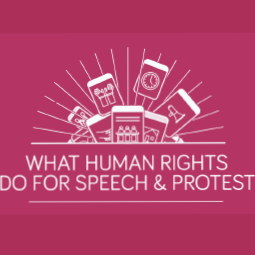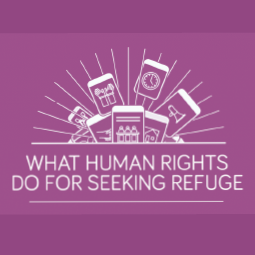Access to healthcare is a universal human right.
The right to health doesn’t mean you’re guaranteed free healthcare, but it is the right to the highest attainable standard of health. This means states must give equal access to the right to health for all of us. The right to health applies to everyone, no matter what their immigration status may be.
In practice, this means that the State must have measures in place to ensure medical services and medical attention are given to everyone in the event of ill health. People who travel to the UK for whatever reason have just as much right to use National Health Services if they need to than any home citizen.
This includes individuals who have travelled to Britain to seek asylum.
What Is An Asylum Seeker?
Video credit: EachOther / EHRC www.websiteaddress.com
An asylum seeker is someone who travels to another country for protection because they face persecution abroad.
Those seeking asylum may also seek humanitarian or temporary protection, including a claim under Article 3 of the Human Rights Convention because they fear serious harm, torture, inhumane and degrading treatment or punishment.
Unfortunately, a recent Equalities and Human Rights Commission (EHRC) report found when people seeking asylum get to the UK, they face several barriers in accessing public services, like the NHS.
What’s more, asylum seekers are likely to have particular healthcare needs caused by the distressing experiences they may have faced, as well as the trauma of being made to flee a country.
What Challenges Have Asylum Seekers Faced In The UK?

Caption below image with homepage link
The cost of prescriptions and treatment, as well as fears over their immigration status and discrimination, were amongst the issues the EHRC found that were preventing people seeking asylum, or those who had been refused, from accessing the healthcare they desperately needed.
Many people have gone without medical help since ministers forced the NHS in England to impose upfront charges to access healthcare last year.
The research was conducted by Imperial College London and Doctors of the World on behalf of the Commission and highlighted experiences of asylum seekers – including concerns that they would be asked to give information to healthcare officials that would be passed on to the Home Office, and potentially to the authorities in the home country they had escaped from that had been responsible for their torture or inhumane treatment.
Speaking of her experiences, an anonymous asylum seeker said: “My husband was having blackouts and had a problem with his heart, but we were really afraid to go to the hospitals.”
“We didn’t know what would happen if we went there and they checked our application status. So there were times we decided to stay at home and not go.”
My husband was having blackouts, and had a problem with his heart, but we were really afraid to go to the hospitals.
-UK Asylum seeker
This text is creating a little gap
Healthcare professionals also lacked knowledge of the entitlement and eligibility of asylum seekers to UK healthcare.
-James Dean, concerned nurse
One individual who tried to register with a GP was told: “We don’t accept refugees and asylum seekers, that is our policy.”
The only reasons a GP surgery can refuse registration are if the patient list is full or the patient provides proof of address outside the area it covers.’
Some asylum seekers were worried that their health conditions, particularly those considered stigmatising such as HIV or mental health conditions, would be taken into consideration during the asylum process. They also found it difficult to build trust in healthcare professionals if they’d had a particularly traumatic experience with migration.
Furthermore, information provided to asylum seekers about their rights to healthcare were not always accurate – or available in a language, they could understand. Often, interpreters were not provided to those that needed them, and these individuals remained unaware of their rights.
What Do People Need To Know About Accessing Healthcare In The UK?
Here’s a quick summary of the facts you need to know about your right to free healthcare in the UK:
- Everyone in England, Scotland and Wales is entitled to free primary healthcare and free emergency healthcare. This includes care at community facilities, GP surgeries, and mental health centres.
- People can do so without the need to provide proof of address or identity. This includes registering at a GP surgery.
- However, having one of these will help to avoid delays and misunderstandings, the EHRC advises: an HC2 certificate, ARC care, documents from the Home Office showing that you have applied for asylum, a utility bill, or any form of identification that shows a date of birth.
- An HC2 certificate should be provided to all those who have applied for asylum and been granted support by the Home Office. This shows that they are entitled to free prescriptions, as well as waiving any other healthcare costs.
- Information about people’s health can only be used to inform Home Office decisions about where they are placed to live (for example, a ground floor and accessible flat for a disabled individual) or support.
- No application or asylum in the UK should be affected by an illness, or any treatment an individual may be having.
- People also have the right to ask for an interpreter if they need one.








